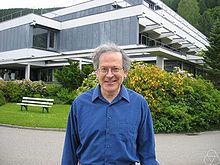Leslie Valiant

(photo from MFO)
Leslie Gabriel Valiant (born 28 March 1949) is a British computer scientist and computational theorist.
He was educated at King's College, Cambridge, Imperial College London, and University of Warwick where he received his Ph.D. in computer science in 1974. He started teaching at Harvard University in 1982 and is currently the T. Jefferson Coolidge Professor of Computer Science and Applied Mathematics in the Harvard School of Engineering and Applied Sciences. Prior to 1982 he taught at Carnegie Mellon University, Leeds University, and the University of Edinburgh.
Valiant is world-renowned for his work in theoretical computer science. Among his many contributions to complexity theory, he introduced the notion of #P-completeness to explain why enumeration and reliability problems are intractable. He also introduced the "probably approximately correct" (PAC) model of machine learning that has helped the field of computational learning theory grow, and the concept of holographic algorithms. He also works in computational neuroscience focusing on understanding memory and learning.
He received the Nevanlinna Prize in 1986, the Knuth Prize in 1997, and the EATCS Award in 2008. He is a Fellow of the Royal Society (London), a Fellow of the American Association for Artificial Intelligence, and a member of the National Academy of Sciences (USA).
One of his significant research papers was proving, along with Vijay Vazirani, UNIQUE-SAT ∈ P → NP = RP (Valiant–Vazirani theorem).
External links
- DBLP:Leslie G. Valiant.
- Home page (Including photograph).
- EATCS 2008 Award motivation
- 1949 births
- Living people
- Members of the National Academy of Sciences
- British computer scientists
- Theoretical computer scientists
- British Jews
- Jewish scientists
- Alumni of Imperial College London
- Alumni of the University of Warwick
- Harvard University faculty
- Fellows of the Royal Society
- Fellows of the American Association for Artificial Intelligence
- Fellows of the American Association for the Advancement of Science
- Knuth Prize laureates
- British scientist stubs
- British computer specialist stubs
